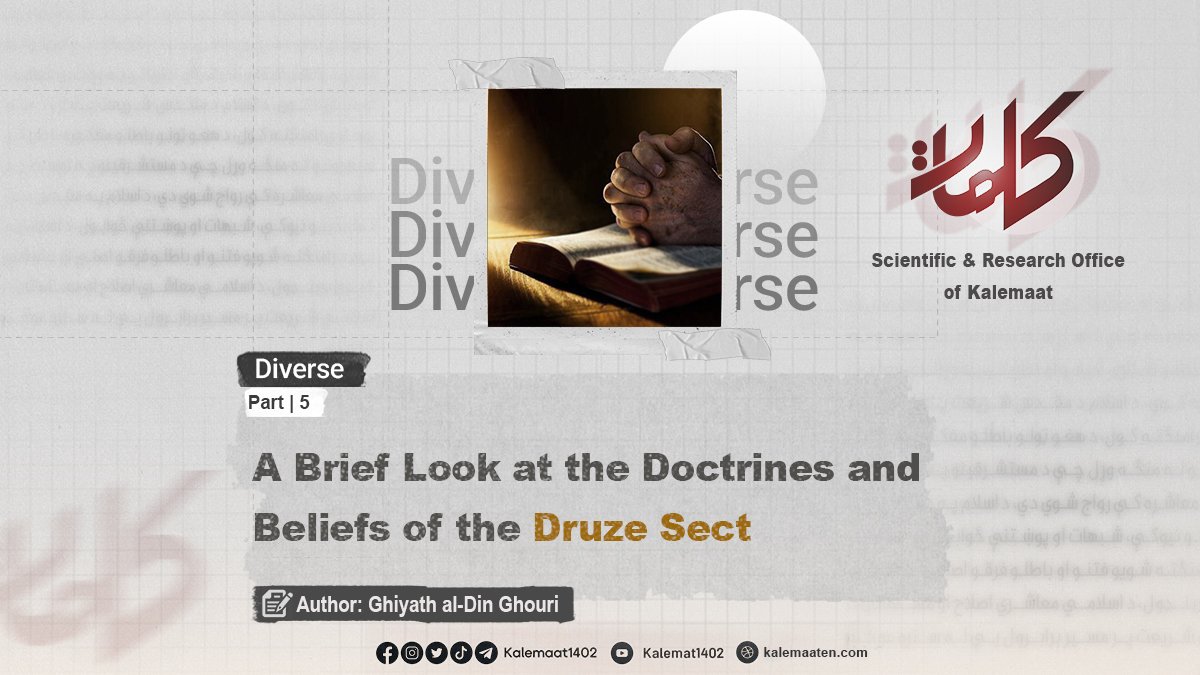
Author: Ghiyath al-Din Ghouri
A Brief Look at the Doctrines and Beliefs of the Druze Sect (Part 5)
Druze Books and Texts
They have a collection of sacred writings called «رسائل الحکمة» “Rasa’il al-Hikmah”, this collection consists of 111 treatises and its authorship is attributed to Hamza, Baha’ al-Din and Tamimi.
-
«رسائل الحکمة» Rasa’il al-Hikmah (Wisdom Letters)
The most important source of Druze beliefs and contains the official and intellectual teachings of the sect.
The themes of these treatises are:
-
Call to the divinity ruling by Al-Hakim;
-
Confirmation of the reincarnation of souls;
-
Interpretation of the Sharia and the denial of the outward appearance of religion;
-
Principles of classifying humans and the obligation of Taqiyyah.
“Rasa’il al-Hikmah” in fact form the backbone of the Druze religion.
They have a Quran which they call «المنفرد بذاته» “Al-Munfared Bezateh”.
-
«کتاب النقاط و الدوائر» “Kitab Al-Noqhat wa Al-Dawayer”
The author of this book is Baha Uddin Al-Naqash.
In this book, complex philosophical and symbolic concepts are discussed; such as:
-
The relationship between the Creator and the creature;
-
The place of numbers in the universe;
-
The spiritual levels of humans and their role in the cosmic system.
This book was written mostly for Druze intellectuals and its language is cryptic and difficult to understand.
Some historians have attributed it to Hamza ibn Ali; but others consider it to be attributed to “Abdul Ghaffar Taqi al-Din al-Buaqli”, who was killed in the year 900 AH.
Another important work of theirs is «میثاق ولیالزمان» “Misaq wali Al-Zaman”, which was written by Hamza ibn Ali and is considered one of the main texts of the Druze. The Druze belief is clarified In this book.
They also have a book called «النقض الخفي» “Al-Naqz al-Khafi” in which Hamzah has declared all the laws of Islam invalid, especially the five pillars of Islam.
Another book called «أضواء على مسلك التوحيد» “Azwa’ Ala’ Maslak Al-Tawhid” by Dr. Sami Makarem is also available in this field, which examines their monotheistic beliefs.
-
The book «الدعوة و التبشیر» “Al-Da’wah wa Al-Tabshir”
This book is a collection of preaching teachings that were distributed among the people at the beginning of the Druze’s Da’wah.
Its purpose was to attract new followers, emphasize the dominant personality, and spread esoteric beliefs.
These works are kept strictly secret today, and only the elite have access to them.
Principles for accepting new members
The Druze have strict conditions for new people to join their sect:
-
The person must be tested and examined for a long time;
-
Commit to silence and Taqiyyah;
-
Avoid any contact with opposing books or scholars;
-
Do not reveal the secrets of the sect under any circumstances.
This trend has made it very difficult for foreigners to access Druze beliefs.
Methods of Education and Training
Druze teachings are secret, classified, and limited to specific circles;
Non-Muslims (the common people) do not have the right to access doctrinal texts;
Only special members (Druze intellectuals) can read and teach these texts.
In this section, the author emphasizes that this method is contrary to the Islamic method of teaching and promoting science and religion, which is based on clarity, transparency, and public invitation.
Characteristics of Druze texts
Their texts are full of symbolic, metaphorical, and interpretive words; Words such as: «الحدّ»“Al-Hadd”, «المثل»“Al-Mathal”, «المبدأ»“Al-Mabdah”, «التناسخ»“Al-Tanasokh”, «العقل»“Al-Aql”, «السبیق»“Al-Sabiq”, and «اللاحق»“Al-Laheq” they have been specifically.
Most concepts seem vague and obscure from an external perspective, and one must be familiar with the internal Druze thought system to understand them.
Summary:
The Druze religion is based on texts that are deliberately complex, cryptic, and kept out of reach of the public. This structural secrecy reflects their deviant and sectarian nature. Unlike Islam, which emphasizes enlightenment and the spread of knowledge, the Druze religion insists on mystery and elitism.
Continues…



